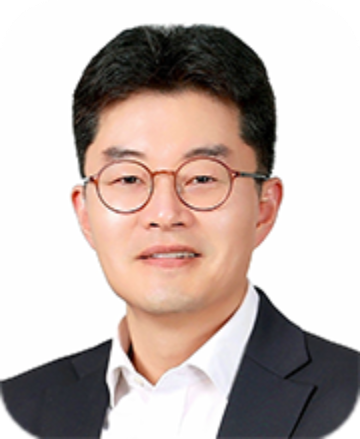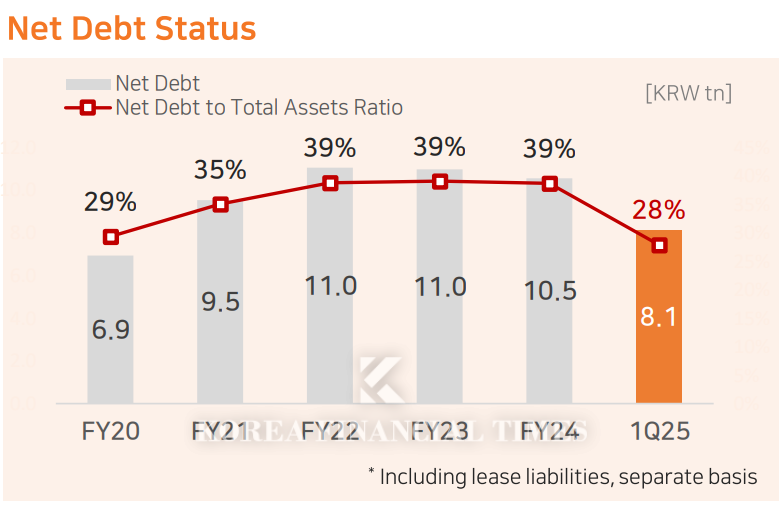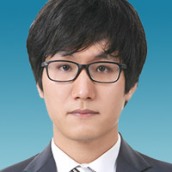Since 2016, SK Inc. has engaged in active investment activities. Investments included SK Materials (semiconductor materials), SOCAR (car sharing), SM Core (logistics) in 2016; ESR Cayman (logistics), SK Siltron (semiconductor materials), Plutus Capital (hydrogen investment) in 2017; Grab (car sharing), SK Pharmteco (bio contract development and manufacturing) in 2018; and Masan and Vingroup (Vietnam) in 2019, among others.
Former CFO Lee Sung-hyung was considered the right person to support these investment activities. He joined SK Innovation, led the corporate finance team at SK Securities, served as head of finance at SK Inc., and was CFO of SK Telecom. From 2017 to 2024, he served as CFO of SK Inc., gaining a deep understanding of the group’s overall businesses.
 이미지 확대보기
이미지 확대보기Vice President Kim Ki-dong is classified as a different type of CFO. Unlike his predecessor, who was investment-focused, Kim has stably managed overall finances.
Kim joined SK Engineering & Construction and held positions such as Head of Finance at SK Chemicals, Head of Finance at SK Discovery, and Head of Management Support at SK Chemicals. He has consistently worked within SK Discovery affiliates under Vice Chairman Chey Chang-won’s control. His transfer to SK Inc., the holding company led by Chairman Chey Tae-won, to take charge of financial affairs, was seen as highly unusual.
SK Inc. appears to expect Kim to fulfill the traditional CFO role, namely, maintaining financial soundness through cash liquidity management and debt control. The position of Portfolio Management (PM) head, overseeing investment activities for new growth engines, has been assigned to Vice President Kang Dong-soo. Former CFO Lee Sung-hyung had previously held both the CFO and PM head roles.
This change comes amid rapidly shifting internal and external conditions for SK. After the end of the pandemic, interest rates have risen to curb inflation, significantly increasing borrowing costs. In addition, SK is experiencing sluggish performance in all areas except semiconductors, including energy and batteries.
As a result, in December 2023, SK Group began a “rebalancing” under the supervision of Vice Chairman Chey Chang-won. This included supporting affiliates with quality assets (SK E&S + SK Innovation, SK Materials Airplus + Essencore → SK Ecoplant) and selling non-core assets (SK Specialty, SK PU Core).
Restructuring some businesses has also yielded financial results. SK Inc.’s Net Debt (Interest-bearing Debt – Cash and Cash Equivalents), which soared to KRW 11 trillion at the end of 2022, decreased to KRW 8.1 trillion by the end of Q1 this year. The company’s Net debt to Total Assets Ratio dropped from 39% to 28%.
 이미지 확대보기
이미지 확대보기Gwak Horyung (horr@fntimes.com)
[관련기사]
가장 핫한 경제 소식! 한국금융신문의 ‘추천뉴스’를 받아보세요~
데일리 금융경제뉴스 Copyright ⓒ 한국금융신문 & FNTIMES.com
저작권법에 의거 상업적 목적의 무단 전재, 복사, 배포 금지













!['From Heavy Industry to Humanoids' — Doosan Robotics Charts a New Future in Physical AI [K-Humanoid Wars, Part 3]](https://cfnimage.commutil.kr/phpwas/restmb_setimgmake.php?pp=006&w=284&h=214&m=5&simg=2026030310061306979141825007d12411124362.jpg&nmt=18)

!['Samsung's Bet on the Future' — Rainbow Robotics, Korea's Humanoid Pioneer [K-Humanoid Wars, Part 2]](https://cfnimage.commutil.kr/phpwas/restmb_setimgmake.php?pp=006&w=284&h=214&m=5&simg=2026022413501808272141825007d12411124362.jpg&nmt=18)
![Tesla's Humanoid Rival Has Arrived — Boston Dynamics Eyes $70 Billion Valuation [K-Humanoid Wars, Part 1]](https://cfnimage.commutil.kr/phpwas/restmb_setimgmake.php?pp=006&w=284&h=214&m=5&simg=2026022010243207659141825007d12411124362.jpg&nmt=18)

![Samsung's 'Last Chance': Lee Jae-yong Pushes HBM4 as Make-or-Break Moment [KFT Topic]](https://cfnimage.commutil.kr/phpwas/restmb_setimgmake.php?pp=006&w=284&h=214&m=5&simg=2026012623242806011141825007d122461258.jpg&nmt=18)
![Tesla's Humanoid Rival Has Arrived — Boston Dynamics Eyes $70 Billion Valuation [K-Humanoid Wars, Part 1]](https://cfnimage.commutil.kr/phpwas/restmb_setimgmake.php?pp=006&w=110&h=79&m=5&simg=2026022010243207659141825007d12411124362.jpg&nmt=18)
!['Samsung's Bet on the Future' — Rainbow Robotics, Korea's Humanoid Pioneer [K-Humanoid Wars, Part 2]](https://cfnimage.commutil.kr/phpwas/restmb_setimgmake.php?pp=006&w=110&h=79&m=5&simg=2026022413501808272141825007d12411124362.jpg&nmt=18)


